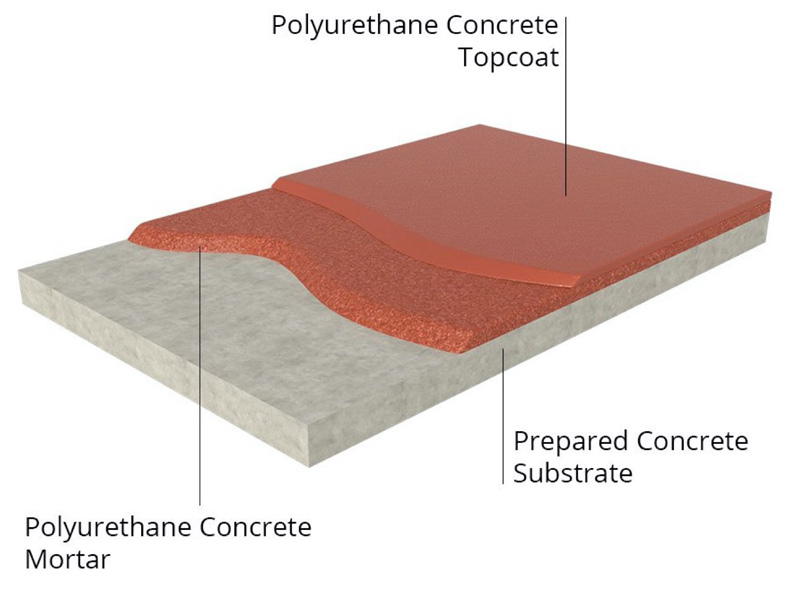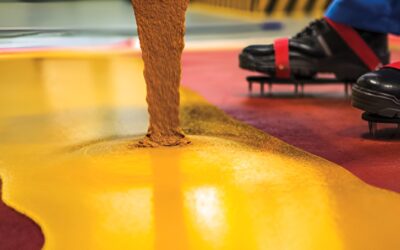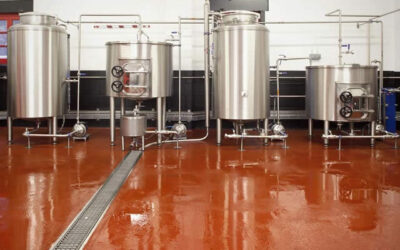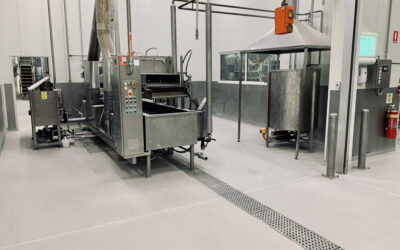Polyurethane Cement Flooring.
Polyurethane Cement Flooring: The Ultimate Solution for Demanding Environments
Polyurethane cement floors, also known as urethane cement floors or polyurethane concrete floors, offer a specialised concrete surface solution with exceptional durability and hygiene. Combining the inherent strength of traditional concrete with the flexibility and chemical resistance of polyurethane, this flooring type is ideal for a wide range of commercial and industrial applications.
Often referred to as urethane cement or polyurethane concrete, these floors excel in demanding environments, particularly within the food and beverage industry, thanks to their toughness, hygienic properties, resistance to chemicals and thermal shock, slip-resistant qualities, and design flexibility.
Key Benefits of Polyurethane Cement Flooring
-
Hygienic Surface:
The seamless and non-porous nature of polyurethane makes it easy to clean and sanitise, crucial for preventing contamination in food processing facilities.
-
Chemical Resistance:
Highly resistant to cleaning agents, acids, alkalis, and oils, making it ideal for environments where chemical spills are common.
-
Durability:
Withstands heavy foot traffic, machinery, and equipment without cracking or chipping. Also resistant to abrasion and impact.
-
Thermal Stability:
Urethane cement can endure extreme hot and cold temperatures, essential for facilities with freezers or large temperature variations.
-
Slip Resistance:
Provides a safe working environment, even when wet, reducing the risk of slips and falls.
-
Customisable Aesthetics:
Available in various colours and finishes to match your facility’s design requirements. Explore colour choices
-
Toughness:
The polyurethane mix creates a tough, abrasion-resistant surface, ideal for high-traffic areas like factories and commercial kitchens.
-
Cleanliness and Sanitation:
Easy to sweep, mop, and sanitise, preventing the trapping of dirt and debris.
-
Long Lifespan:
With proper care, polyurethane cement floors offer a cost-effective, long-lasting flooring solution.
-
Ease of Installation:
Relatively quick and easy to install, minimising downtime for your operations.
-
Environmental Benefits:
Made from sustainable materials with a low environmental impact. Their long lifespan reduces waste.
-
Temperature Regulation:
Insulating properties help maintain consistent temperatures, crucial for food storage and processing.
-
Noise Reduction:
The dense composition reduces noise levels, creating a more comfortable working environment.
-
Compliance with Industry Standards:
Meets stringent health and safety regulations for the food and beverage industry.
Epoxy or Polyurethane cement?
The differences between epoxy and polyurethane cement floors are their chemical makeup and their physical properties.
Epoxy is a thermosetting resin which hardens when exposed to heat or a catalyst. Epoxy floors are known for their hardness, durability, and chemical resistance, making them popular for industrial and commercial applications.
On the other hand, polyurethane is a thermoplastic polymer and, when integrated with cement creates floors known for their flexibility, impact resistance, temperature resilience and ability to withstand heavy loads and foot traffic.
Ultimately, the choice between epoxy and polyurethane cement flooring depends on the application’s specific needs, including the type of industry, the amount of traffic, the types of chemicals and substances present, and the level of flexibility and impact resistance required. For more information about benefits, see this article.
We at Diamond Grind are happy to discuss the differences in detail and help you make the best choice for your particular purposes.
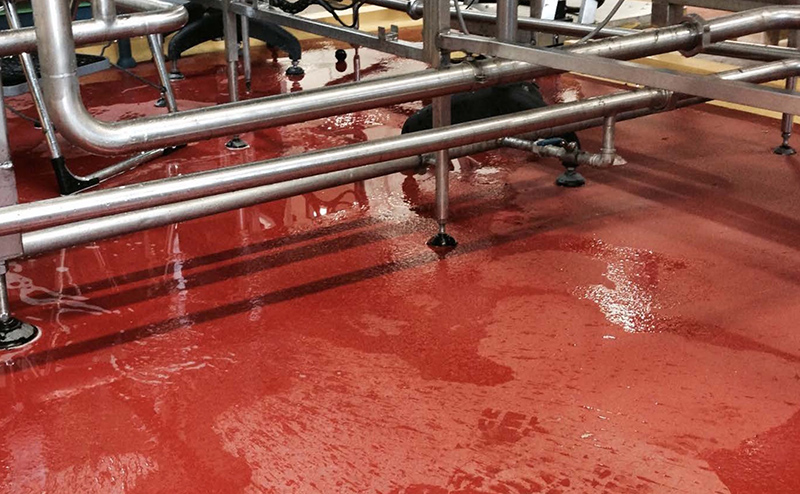
Read more about Polyurethane Cement Flooring from our Blog.
What is Better – Resin Flooring vs Polyurethane Flooring?
Choosing the right flooring for your industrial or commercial facility can be challenging. Learn the key differences between resin flooring and polyurethane flooring to make an informed decision. Our experts explain the unique benefits of each option, from chemical resistance to durability and hygiene. Whether you need a cost-effective solution or a high-performance floor, this article will guide you through the process. Read on to discover which flooring type best suits your needs and why professional installation is crucial for long-lasting results.
Enhancing your brewery
Discover the best flooring solution for your brewery. Compare the durability, chemical resistance, and aesthetic customization of polyurethane and epoxy floor coatings. Learn which coating fits your brewery’s unique needs, from heavy-duty use to visual appeal.
Helpful Food and Beverage Industry Floor Guide
Selecting the right flooring for industrial food and beverage facilities is crucial for safety, hygiene, and durability. Learn about top options like polyurethane cement, epoxy, and polished concrete flooring. Discover how each offers unique benefits, including chemical resistance, anti-slip properties, and easy maintenance. Explore expert advice to find the best flooring solution for your food and beverage operation.
FAQ,s

What is polyurethane cement flooring and why choose it for my facility?
Polyurethane cement flooring, also known as urethane cement or polyurethane concrete, combines the strength of concrete with the flexibility and chemical resistance of polyurethane. It’s ideal for demanding environments needing durability, hygiene, and thermal shock resistance. Choose it for its seamless, non-porous surface that prevents contamination and withstands heavy traffic. For more on how it compares to other options, visit our Epoxy Flooring page.
What are the key benefits of polyurethane cement floors?
Key benefits include superior hygiene for easy sanitisation, high chemical resistance to acids and oils, exceptional durability against abrasion and impact, thermal stability for extreme temperatures, and slip resistance for safety. It also offers a long lifespan, reducing long-term costs, quick installation to minimise downtime, and compliance with standards like HACCP. These make it a cost-effective choice for high-traffic areas in NSW.
Which industries or applications suit polyurethane cement flooring best?
It’s perfect for food and beverage sectors like dairies, wineries, and commercial kitchens, as well as factories, garages, workshops, and areas with chemical exposure or temperature variations. Its hygienic, anti-slip properties ensure safety and compliance in facilities across Sydney, Hunter Valley, and regional NSW. If you’re in the food industry, explore our DiamondCrete page for tailored HACCP-compliant solutions.
How does polyurethane cement flooring compare to epoxy flooring?
Polyurethane cement offers greater flexibility, impact resistance, and thermal resilience, making it better for heavy loads and temperature fluctuations, while epoxy provides hardness and chemical resistance for less demanding settings. The best choice depends on your needs—polyurethane excels in food processing due to its thermoplastic properties. For a detailed comparison, check our blog post on Which is Better: Epoxy or Polyurethane Cement?.
How can I get a quote for polyurethane cement flooring in NSW?
Call us at 1800 587 172 for a 100% free, no-obligation consultation and quote. We’re based on the NSW Central Coast and serve areas like Sydney, Hunter Valley, and beyond. Let’s discuss your project today!
✅ Let's Talk — DiamondGrind
100% free consultation — no commitment required.

